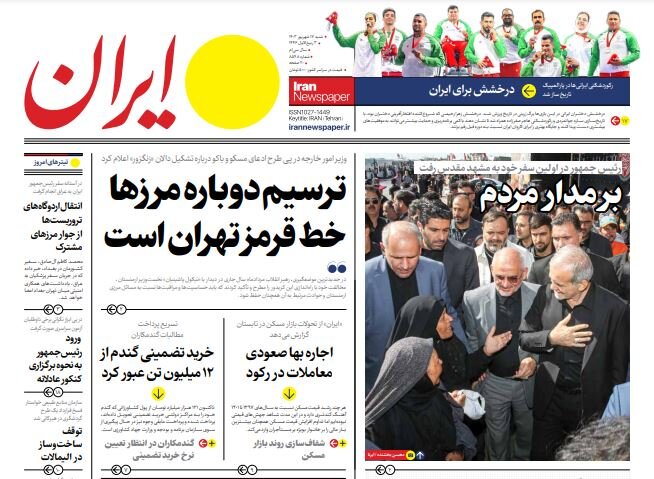Redrawing borders is Tehran's red line

TEHRAN - In an analysis, the Iran newspaper discussed support for the establishment of the so-called "Zangezur" corridor by Moscow and Baku.
It wrote: The construction of the (so-called) Zangezur Corridor will cut off Iran's territorial connection with Armenia, as well as the country's transit routes in the north and northwest towards Europe for export and import. In the midst of these developments and the alleged positions of the authorities in Russia and the Republic of Azerbaijan, what should not be forgotten is the fact that the Islamic Republic, as an important and influential actor benefiting from the highest level of power in the region, is adamant on its principled approach in the Caucasus region. Therefore, the wrong policy can be costly for the relationship between Iran and its allies. Ilham Aliyev knows well that extraterritorial ambitions are no longer possible and will not be tolerated by the great powers of this region, especially Iran, and is considered a red line for Iran.
Vatan-e-Emrooz: Iran's action in the Middle East
Vatan-e-Emrooz pointed to Iran's appropriate behavior in the Middle East and said: The war in Gaza shows that the Middle East is very close to a full-scale war. It is not only the Middle East that suffers from such a situation. In the northwestern borders of Iran, the border dispute between Azerbaijan and Armenia, Russia's positions against Iran's northwestern borders, and in the south, Russia's strange positions on the three Iranian islands have become controversial. In this situation, Iran must act intelligently to obtain the highest level of security, power, and benefits. For example, diplomacy is important in situations where the interests of governments conflict. Diplomatic negotiations facilitate the path for compromise, but in international relations, the most important and reliable tool is power balance. This strategy is considered the most effective way to maintain the independence and sovereignty of governments. It prevents expansionist policies that can lead to disorder or dominance of one government over others.
Hamshahri: Coordinated battle and diplomacy against terrorists
In a commentary, Hamshahri dealt with the disarmament of the separatists in Iraq. The paper said: Relocating some headquarters of terrorist groups in the Kurdistan Region of Iraq, as well as the effort to disarm them, should be considered a turning point in the Tehran-Baghdad "security diplomacy" over the past 2 years. Although the terrorist activities of the separatist groups in the Kurdistan region have always been one of the most important points of discussion between the Iranian and Iraqi authorities in the past decades, this issue has become the main security demand of Iran from Iraq since the fall of 2022. Following the riots of the fall of 2022 and the destructive and terrorist role of separatist groups in creating chaos and insecurity in the country, especially in the northwestern provinces of the country, political-security follow-ups to effectively deal with the terrorist activities of these groups entered a new phase. Finally, the complete disarmament of the terrorist groups based in the Kurdistan region of Iraq took effect and members of these terrorist groups were transferred to special camps, and the separatist terrorists were relocated from the northwestern borders of Iran.
Donya-e-Eqtesad: Three scenarios for Iran
Donya-e-Eqtesad wrote about the so-called Zangezur corridor and possible scenarios. It said: The Islamic Republic of Iran will face three scenarios. First, the Republic of Azerbaijan and the supporters of the Zangezur corridor project should abandon such a plan and, as before, the Republic of Azerbaijan should use the Iranian route to connect to the Republic of Nakhchivan. The second scenario is that this corridor is created under the rule of Armenia and the Republic of Azerbaijan travels through such a corridor under the supervision of the Armenian government. But the third and most dangerous scenario is that the Republic of Azerbaijan take a greedy step and occupy this region, which will change the border between Iran and Armenia. Iran has repeatedly warned against such a move, and perhaps the first option that comes to mind in the event of occupying Syunik province is to use the military option. But it is clear that if Iran wants to enter into a military conflict in its northern borders, it will have many consequences. So how much better is it that Tehran prevents such a scenario from happening through diplomacy.
